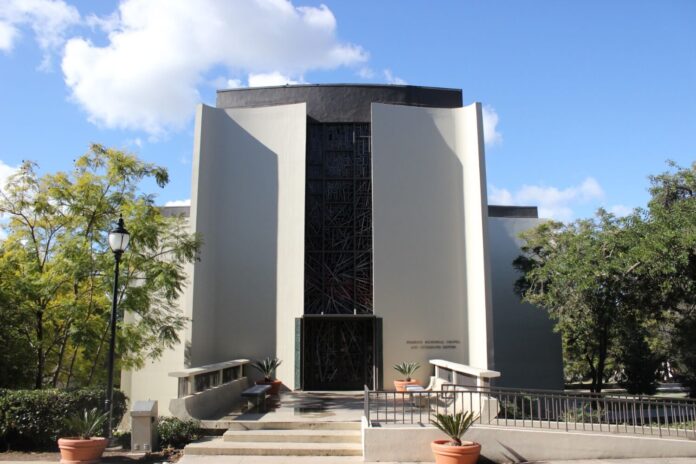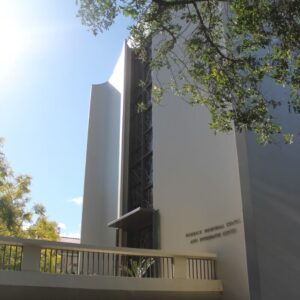
Interfaith America, an organization that works with both secular and religious colleges to solve challenges with interfaith cooperation, hosted listening sessions at Occidental College Jan. 25-26 “to provide neutral and welcoming spaces for reflection on campus tensions, and to promote bridge-building through facilitated dialogue,” according to an email addressed to all Occidental students. Sent Jan.16, the email was written by the co-chairs of the Task Force on Promoting Community and Safety, Vice President for Academic Affairs and Dean of the College Wendy Sternberg and Assistant Vice-President for Student Affairs and Associate Dean of Students Vivian Garay-Santiago.
President Harry Elam announced the creation of the Task Force on Promoting Community and Safety and the contract between the college and Interfaith America in a Nov. 30 email following back-and-forth email chains between faculty members, an occupation of the Arthur G. Coons administrative building (AGC) by Students for Justice in Palestine (SJP) last Fall and a national outbreak of conflict on college campuses that questions how to address the war in Gaza. In the email, Elam said that the Occidental community is obliged to prevent the occurrence of antisemitism and Islamophobia on campus.
According to the Interfaith America website, their “mission is to inspire, equip, and connect leaders and institutions to unlock the potential of America’s religious diversity.”
Tina Grace, a program manager with Interfaith America who helped lead the listening sessions on campus, said that Interfaith America focuses on more than just religious pluralism in higher education and the corporate sector.
“We did listening sessions to collect some data about the nature of the campus environment,” Grace said. “We were asked to collect that because we wanted to give some suggestions on ways that you all can move forward in a positive direction to try to minimize some of that tension on campus.”
SJP announced via Instagram post Jan. 25 that they were boycotting the listening sessions because of Interfaith America’s status as a religious non-profit.
In a statement to The Occidental, SJP said they came to this decision along with the organizations in their coalition, “[…] after rounds of deliberative, census-based debate where the decision to not participate was a remarkably popular decision.”
“We respect the mission of Interfaith America, however we reject their employment on the basis that Palestine is simply not an issue of religious dialogue or ‘coming together’ if we don’t recognize the core roots of oppression, violence and dispossession,” SJP said in their Instagram post.
Interfaith America said in a statement to The Occidental, “We support SJP’s right to boycott and we’re grateful for the overall engagements we had with students on campus.”
According to Sternberg, the Interfaith America sessions were not intended to be focused on religious experiences on campus.
“We recognize that religion is only one element of the conflict in the Middle East and how people respond to it around the world,” Sternberg said via email.
Sternberg said that the Faculty Council recommended Interfaith America to Elam before he launched the Task Force effort because of its experience dealing with both secular and religious differences on college campuses.
“We wanted to offer a neutral and confidential forum for community members to share their thoughts — that would have been difficult if the sessions were managed internally,” Sternberg said.
Grace said that coming up with the groups and topics for the listening sessions was a collective decision between the college and Interfaith America. According to the registration form, the sessions offered for students included one for Jewish Identified Students, one for Associated Students of Occidental College (ASOC) leaders, one for SJP/Coalition students and one for members of other student groups.
“We wanted to make sure that, no matter what, we had groups that felt comfortable being honest and open about their experiences,” Grace said.
According to Grace, these listening sessions were not the space to start a conversation across lines of difference, but to collect data on people’s experiences on campus.
In their statement to The Occidental, SJP said they were disturbed by the absence of a session for Muslim, Palestinian or Middle Eastern/North African students.
“The suppression of Jewish voices in support of SJP was further enshrined with the SJP/Coalition session being on Friday from 4 to 5:30 p.m. where the session conflicted with Shabbat,” the SJP statement said.
Professor and chair of the History department and the Gender, Women and Sexuality Studies program Michael Gasper, who is currently teaching a course titled “A History of the Palestine-Israel Question,” said he objected to the college working with Interfaith America.
“The idea of framing this question in terms of religion is a colonial framing,” Gasper said. “It’s a restatement of classic colonial theory that whenever conflict arises, it’s a cultural clash. In fact, it’s not a cultural clash. It’s a very clear political clash that is colonial in nature.”
Gasper said that the people participating in anti-colonial movements are often treated as if there is something wrong with their culture or their religion for them to revolt against the “enlightened hand” of the colonizer.
“As I like to say, I’ve never seen a religion running down the street chasing someone with a gun. I have seen people chasing other people with guns,” Gasper said.
According to Gasper, some of the faculty are baffled that Interfaith America would be brought to campus.
Gasper said that college leadership is directly responsible for the occupation of the AGC in the Fall because of their failure to support all of the constituencies on campus and their refusal to engage in a conversation with students.
“[The administration is] asked to communicate about things they don’t really understand much about,” Gasper said.
President of the Faculty Council and Biology professor John McCormack said that the Interfaith America listening sessions were announced in an email Nov. 30, leaving two months for the faculty to raise concerns before the week of the sessions.
“Faculty Council was the group that had recommended Interfaith America because of their experience with dialogue on college campuses, and we were assured of their ability to carry out the listening sessions impartially for all community members on topics both religious and secular,” McCormack said via email.
McCormack said that, as an atheist, secularism is important to him. According to McCormack, Director of Campus Partnerships Todd Green who was one of the listening session leaders seemed well qualified to listen across multiple dimensions of community concern since he is a PhD scholar and former professor with a book on Islamophobia.

According to Sternberg, no member of senior college leadership attended the listening sessions for community members to be present with one another. All data from the listening sessions, including the number of participants, was sent directly to Interfaith America, not the Task Force, Sternberg said.
“[Interfaith America] will share feedback with the college that includes general themes and suggestions without attribution to anyone’s specific comments,” Sternberg said. “Those themes and suggestions will be shared with the community as one piece of the overall work to help restore the fabric of our community.”
According to Grace, the report from Interfaith America will include the changes that people said they want to see in the community.
Sternberg said that the Task Force has initiated some upcoming events and that faculty and academic departments are planning some opportunities for engaging in conversation as well.
Grace said that Interfaith America will continue working with college leadership to make a concrete plan of either coming back for training sessions or providing training materials to leadership after the analysis is made.
According to Sternberg, Elam has included “rebuilding our community” as one of the aims of the Task Force.
“We hope [Interfaith America’s] report will help illuminate the path forward, but actually making progress will of course require a full community effort,” Sternberg said.
Contact Ava LaLonde at lalonde@oxy.edu
![]()






























